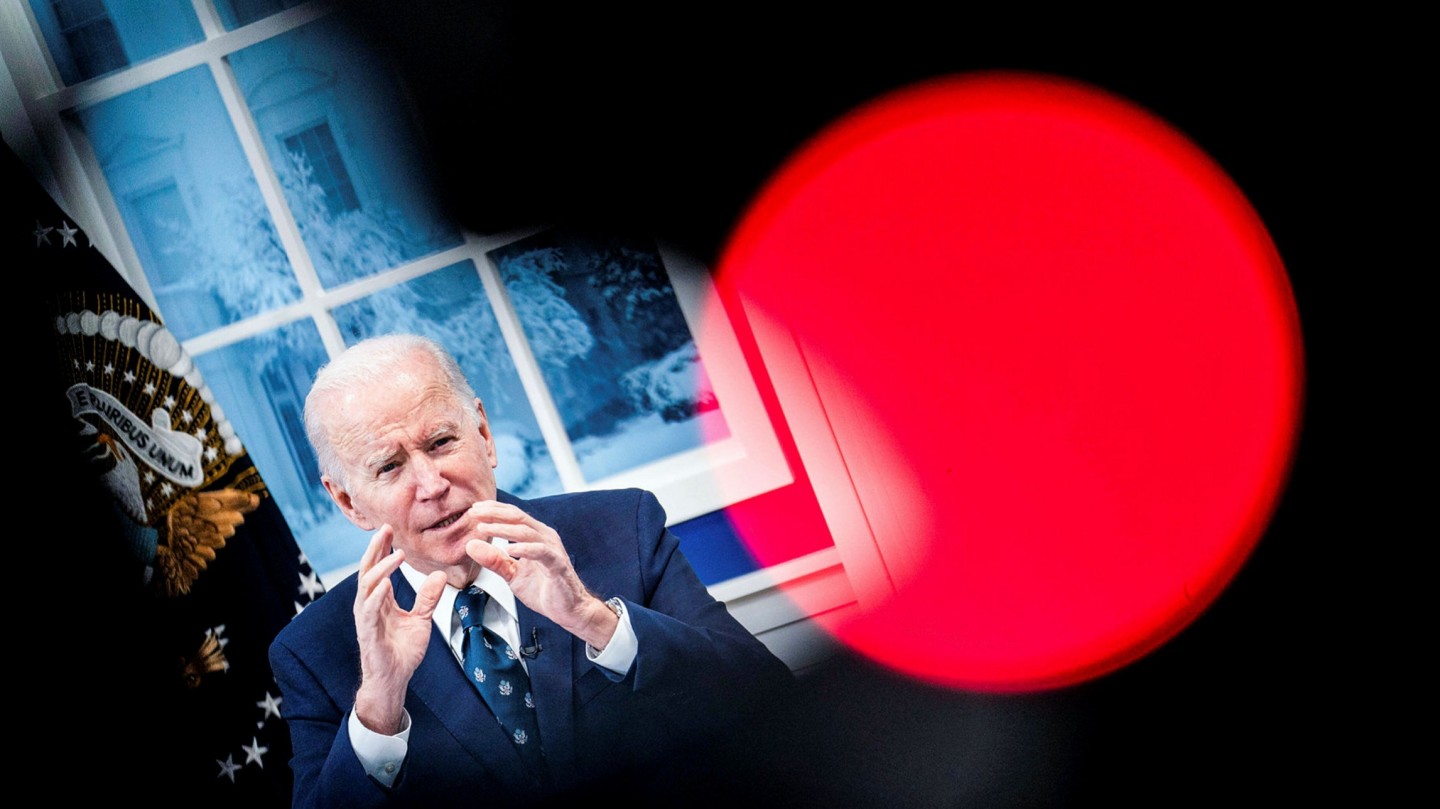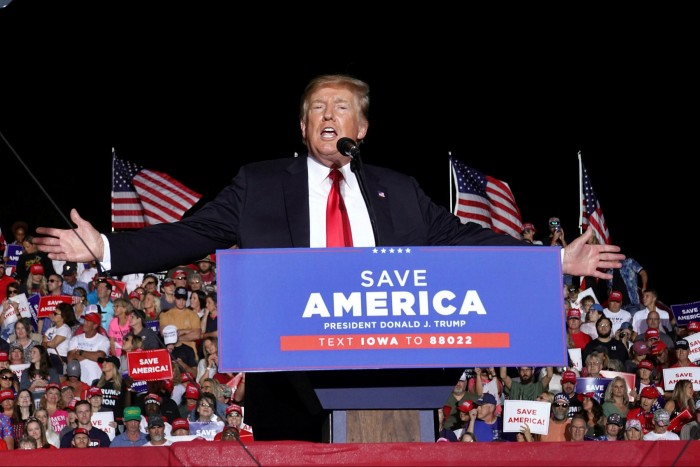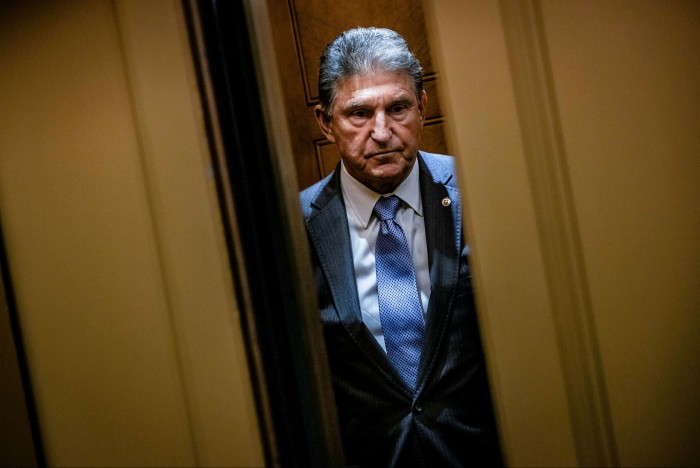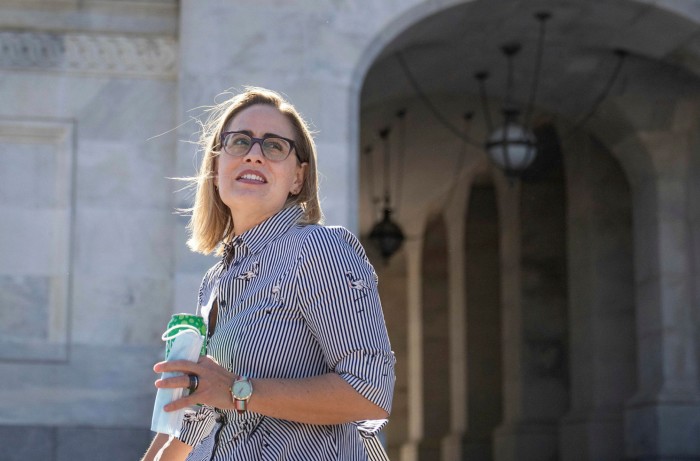Biden’s year of living dangerously

Roula Khalaf, Editor of the FT, selects her favourite stories in this weekly newsletter.
In politics, as in life, there is rarely such a thing as a single moment of truth. Cumulatively decisive series of events are the prosaic norm. Even so, the US’s 2022 midterm congressional elections are likely to come close to being an exception.
If, as polls indicate, Democrats lose control of Congress in November, President Joe Biden will face a profound reckoning. Republicans have made clear that they will use their regained power to stop his agenda in its tracks. But they will be tempted to go much further.
Egged on by Donald Trump, the previous president, conservatives plan to tie up Biden’s White House in investigations. They could go as far as launching an impeachment process against Biden in tit-for-tat retaliation for the two ultimately fruitless Democratic moves against Trump in 2019 and 2021. The stage would be set for an existential Biden-Trump rematch in the 2024 election.
That is America’s dark scenario. It is also the most likely outcome. An alternative one is that Biden will reverse his misfortunes in the first half of 2022 and pull off a midterm surprise. How might that happen?
The single most important development would be one that Biden is almost powerless to do anything about: a change of direction by the Republican party. Contrary to widespread hopes when Biden took office, Republicans have doubled down as the party of Trump and have largely backed his claim that Biden is an illegitimate president.
Far from being a stain on America’s democratic record, the failed insurrection on January 6 2021 is seen by many Republicans as a legitimate protest against a stolen election. Others dismiss the storming of the Capitol as a false flag operation by the deep state. Some Republicans subscribe to both narratives; consistency is not a hallmark of Trumpian conservatives, but the will to power is.
Biden will thus need to muster an equivalent single-mindedness to revive his party’s prospects. As was true when he took office, the pandemic remains his biggest challenge. At some point in the summer, the number of American deaths from Covid-19 is likely to exceed 1m — a grim indicator of America’s inability to contain the virus.

Much of the blame belongs to the roughly 20 per cent of eligible Americans who refuse to vaccinate and the far larger share of the population that abjure social distancing. Biden cannot be blamed for the actions of Republican governors of large states such as Texas and Florida to bar local governments from imposing mask-wearing rules and blunt vaccine mandates. Nor can he be held to account for the wild conspiracy theories that have fuelled the anti-vaxxers.
But Biden has also made errors. The biggest of these was to place all his eggs in the vaccination basket. Once it became clear that many Americans would refuse to take the jab, Biden could have ramped up America’s testing capacity. He failed to do so. A year after he took office, it is still hard to find lateral flow testing kits in local pharmacies. Other democracies have been able to ensure a regular supply.
Biden has also been lacklustre in supplying vaccines to low-income countries. The latest Omicron variant, which has pushed daily Covid cases to record levels, came from South Africa. Another is likely to emerge from an unvaccinated part of the world unless the US and its partners can ramp up global supply.
All this has economic consequences. Until the pandemic is under control, the chances of containing supply-side driven inflation will be weak. Higher prices, in turn, will sap the economic feelgood factor that would assist Democratic midterm prospects.
Aside from tougher pandemic measures, the two biggest actions Biden could take to change the narrative would be to push through his $1.75tn “Build Back Better” spending bill and his two electoral reform bills. It will become progressively harder to pass this legislation in the countdown to the midterm poll, and its fate should be apparent well before then.
Yet Biden’s ability to deliver is limited. With a 50:50 Senate, he must somehow persuade his party’s two most wayward senators — Joe Manchin of West Virginia and Kyrsten Sinema of Arizona — that each of these reforms, and the political manoeuvring that enacting them will demand, are in their interests.


The odds of passing BBB still look reasonable assuming Biden can find a price point that Manchin and Sinema would accept. That might mean removing the proposed increase in child tax credit, which would alienate the Democratic left. But half a loaf would be better than none. Added to the $1.2tn infrastructure bill passed last November, a $1-$2tn BBB bill would lift growth and put money in middle class pockets.
Passing the Freedom to Vote Act and the John Lewis Voting Rights Advancement Act will be tougher, yet far more important to the future of the republic. Together, these measures are intended to hamper efforts in Republican states to introduce voting restrictions. Passing them will, under the Senate’s filibuster rules, require at least a 60:40 majority — unless centrist Democrats such as Manchin and Sinema can be persuaded to scrap or suspend those rules. But both have made clear their opposition to such radical tactics.
With deadlock in the Senate, and a sizeable minority of voters — indeed a majority among Republicans — believing that the 2020 presidential election was rigged, US democracy remains dysfunctional one year on from the Capitol riot. It takes no leap of imagination to picture Trump returning to power in 2025 assisted by the panoply of voter restriction laws passed by Republican states.
If that happens, he will be 78 years old and will become by some months the oldest person ever to assume the presidency. For now, though, that record remains Biden’s. Two weeks after the midterm elections, he will be the first sitting US president to reach 80. The fate of US democracy will partly hinge on whether its ageing leader can instil a renewed sense of vigour into governing.
Letter in response to this article:
An upbeat assessment of Biden’s first year ‘miracle’ / From Fariborz S Fatemi, Former Professional Staff Member, House Foreign Affairs Committee, Senator Foreign Relations Committee, McLean, VA, US
Comments